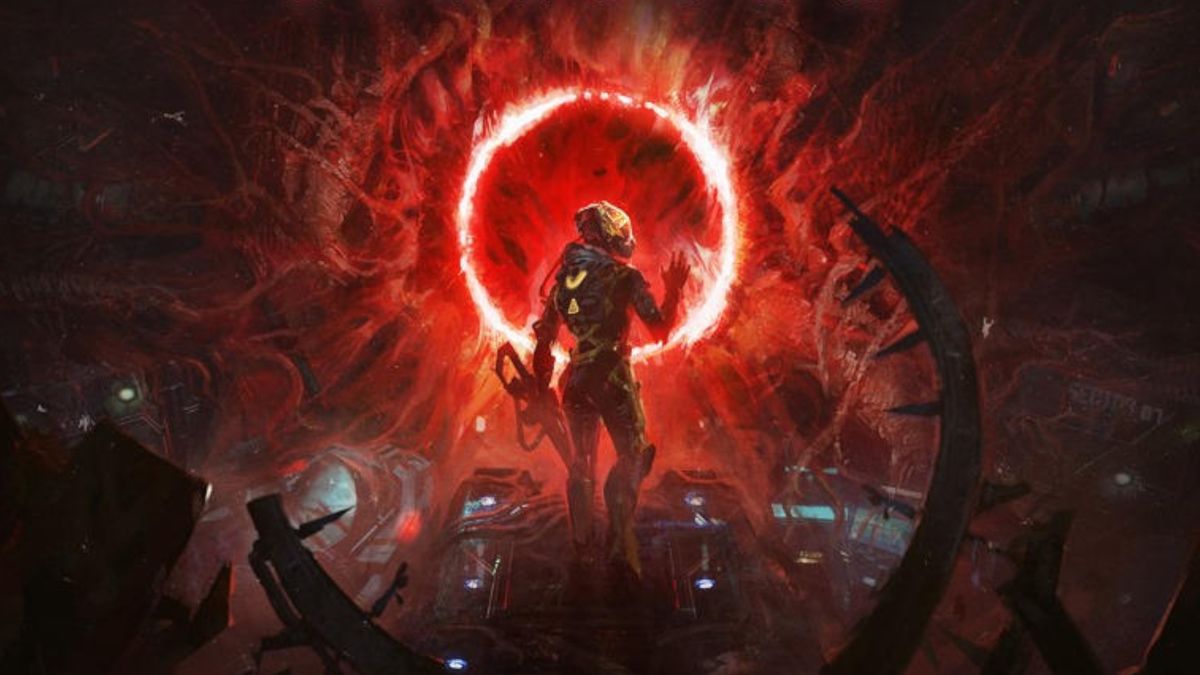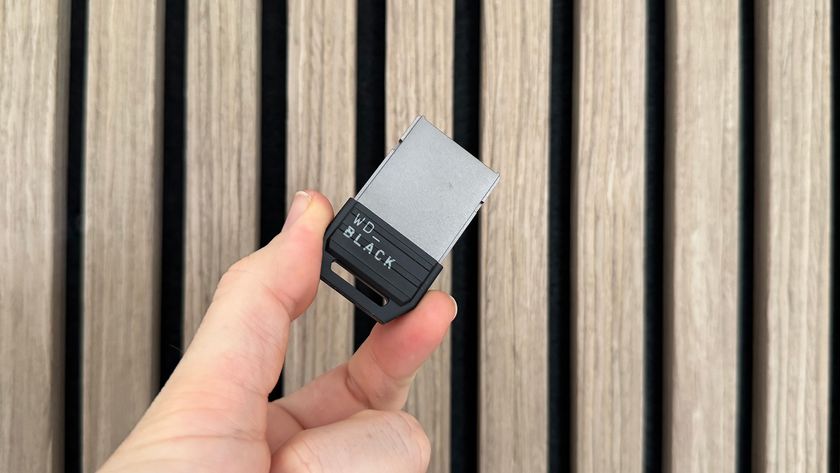12DOVE Verdict
Despite being extremely complicated, Nemesis: Lockdown is a worthwhile investment - every story it tells is different and rich with narrative detail.
Pros
- +
Incredible narrative potential
- +
No two games are the same
- +
Always escalating
- +
Fantastic miniatures
Cons
- -
Very complicated
- -
Requires commitment
Why you can trust 12DOVE
Much like the xenomorphs that inspired it, Nemesis: Lockdown represents the pinnacle of evolution. Building on everything that came before, it's a monstrously ambitious cooperative board game.
It all started because the Alien franchise is so popular. That means there’s a big appetite for board game spin-offs and a high cost to creating one with an official licence, as we suspect Ravensburger can attest thanks to 2021's Alien: Fate of the Nostromo. This led to a lot of rip-off attempts over the years, many of which, in contrast to expectations, have been extremely good (Games Workshop's classic Space Hulk is a fine example). Nemesis: Lockdown falls into that category.
What is it, and how does it work?
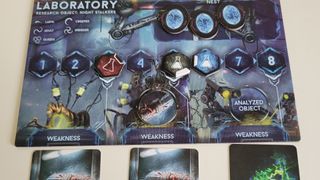
- Game type: Co-op strategy
- Players: 1 - 5
- Difficulty: Hard
- Lasts: 90+ mins
- Ages: 12+
- Price: $95 / £125.99
- Play if you enjoy: Alien, Doom
In 2018, a new fake Facehugger hit the grillwork in the form of Nemesis, which had players trying to survive an alien intrusion onto their spaceship. It attracted great acclaim, becoming a worthier candidate for lists of the best board games than any licenced property has managed thus far. Nemesis: Lockdown is a sort-of sequel that extends the original and can be used to expand it if you own both.
This time, the action has been moved to a complex on Mars, at which the infected spaceship of the original has docked. The players' troubles are far from over, though.
To start with, most of the rooms on its board will be face-down tiles, dealt at random as per Betrayal at House on the Hill. As such, the first order of business is to explore and flip some face-up. Most rooms provide additional actions you can undertake while you’re there. The Transmitter Control Room lets you send a distress signal, for example, while the Guard Room offers up some sweet weapons and armor.
Moving, however, creates noise. And if you make too much noise, there’s a chance this will attract unwelcome attention in the form of alien Night Stalkers, represented by large, gruesome plastic figures. These come in various life cycle stages from larva to queen, drawn at random from a bag. If you’re low on your character's unique cards (used to perform actions), you risk suffering a surprise attack. Otherwise, you can engage in combat or flee, although there’s a high probability you’ll be followed at the end of the turn when aliens activate.
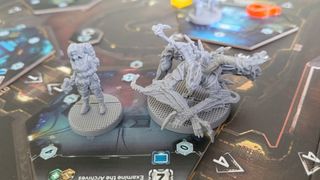
To make matters worse, escaping isn't even the end of your problems - you’ll also face a dangerous event card draw.
Around this basic framework, there’s a jaw-dropping tangle of additional rules and effects. Some rooms start on fire, and too much fire will destroy the complex. Power fluctuates throughout the station, leading to lights going on and off (this is not a place you want to be in the darkness). Powered-up computer terminals can be accessed for various effects. Items can be scavenged or crafted into more powerful combinations. Aliens can be researched and probed for weaknesses. And this is just scratching the surface. There’s more. Much more.
Of particular note is the infection system. When players encounter aliens, they often end up having contamination cards in their action deck. These can’t be played or discarded and so clog up your hand (luckily, some rooms and actions can help you clear them). Worse, each has a hidden code printed on it which can be revealed by placing it into a neat 'scanner' component which resolves the image into letters via a sheet of red plastic. You may be infected, in which case your character is fated to die when the game concludes.
Each player has a hidden objective, some of which involve killing other players
Speaking of which, there are a lot of ways to die in Nemesis: Lockdown. Particularly when you reach the game's end. Each player has a hidden objective, some of which involve killing other players. There’s also a hidden contingency which the arriving corporate suits put into action at the conclusion to try and contain the aliens, and this will kill players who haven’t fulfilled its criteria. As such, a key part of the game is players co-operating - or otherwise - to pin down what this is. To win, you must not only fulfil your objective but escape. The escape routes themselves, via randomly discharging escape pods or out onto the planet’s toxic surface, are filled with peril.
Gameplay - is it any good?
Nemesis: Lockdown is a hard game in every sense of the word. The rules are very complex and presented in an obtuse rulebook rife with minuscule fonts, confusing cross-references, and mislabelling. That makes it tough to get to grips with the strategy, making it hard to win. Even when the game flow is understood, the game is full of things that can kill you - and occasionally end the entire game - entirely randomly. Tactics, such as they are, are mainly about risk mitigation, and it’s hard to escape a sense that the intricacies of the rules are obscuring a paucity of meaningful decisions for players to make.
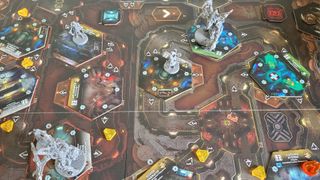
All that complexity and randomness do have a big payoff, though. They interweave to create a sandbox of sci-fi drama in which no two games play out remotely the same. Random rooms and events set the seeds of variety but the sheer, mind-boggling array of different things to do in the game ensures every story it tells is different and rich with narrative detail. One game may see you starting a blaze in the alien’s nest to burn the eggs, then desperately firefighting to stop the whole complex going up in smoke. Another may be a violent shootout where you arm up and tangle repeatedly with alien horrors before trying to lock yourselves in an isolation chamber.
However, it has to be said that other games provide great drama and narrative at a fraction of the overhead Nemesis: Lockdown requires. And the games’ complexity can work against the excitement it wants to generate. It’s hard to maintain the tension and the story when you’re stopping every few minutes to double-check something in the rulebook. But when you’ve got the rules down and the randomness comes together, the result is a joy, an ever-escalating excitement machine that builds toward a crunchy conclusion. The game’s complex mechanics combine to create both strategy and story detail at the same time.
One thing that really stands out is the objectives system. The variety and nuance in the available goals sow a blossoming sense of paranoia as the game progresses. Are one or more of the other players gunning for you, or are their objectives tied to the aliens, or the facility? In a cunning twist, this thick soup of mistrust clogs up the machinery you need to win. To survive the perils of Nemesis: Lockdown you need to work together as much as possible, yet in doing so, you may unwittingly be helping your enemies.
These options increase the sense of variety in this dizzying sci-fi playground
If this sounds like too much, the game also features a set of fully cooperative objectives so you can enjoy it in peace and harmony with your fellow players. Or alone, if you want to recreate the terror of being stalked through the dark corridors of a Martian facility.
There’s also another side of the board that extends the action out onto the surface of Mars with additional rules and card decks, as if the game doesn’t have enough of both already. At the same time, these options increase the sense of variety in this dizzying sci-fi playground.
Overall - should you buy Nemesis: Lockdown?
This can be a box of delights, but before paying the considerable asking price, you need to know what you’re getting into. You’ll need to be prepared to learn and teach a complex game. You’ll need to understand that there’s a significant random element that can and sometimes will torpedo games despite your best efforts at strategizing. You’ll need to find time to play it over and over both to get comfortable with the rules and to explore its smorgasbord of variety. But if you’re content to commit to all that, Nemesis: Lockdown is a rollercoaster ride of nightmare narratives.
Matt is a freelance writer specialising in board games and tabletop. With over a decade of reviews under his belt, he has racked up credits including IGN, Dicebreaker, T3, and The Guardian.

Not for the first time, workers at Fallout, Doom, and The Elder Scrolls parent ZeniMax threaten strike at Microsoft: "Paying your employees a livable wage as a multi-trillion dollar company is the least they could be doing"

You can get an early 5-minute preview of James Gunn's Superman, if you go see A Minecraft Movie
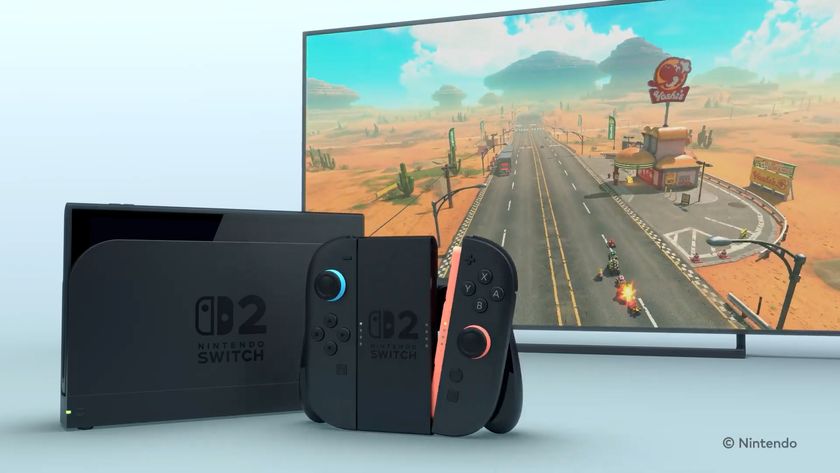
"If it can run on Steam Deck, it can probably run on Switch 2": Ex Nintendo marketing leads say Baldur's Gate 3 and Elden Ring prove there's a market for big AAA games on Switch 2
